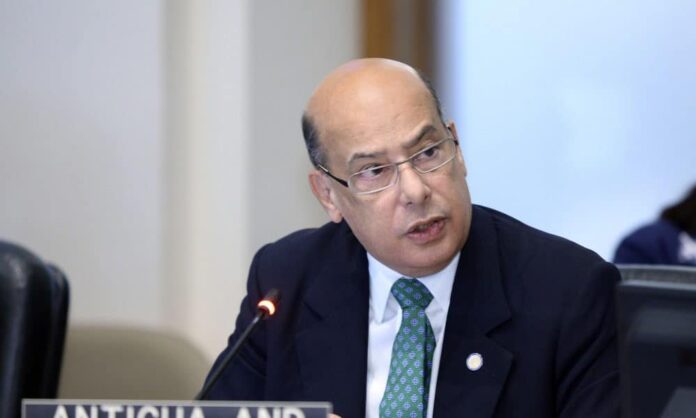The practice has an ugly name and an uglier intent: _arbitrary detention in State-to-State relations means this: tyrannical regimes seize innocents to make other governments submit to their wishes._ As I said on October 28, 2025, at the United Nations, this is “not diplomacy; it is coercion in daylight.” The principle at stake concerns every nation, large or small.
For large powers, such acts of arbitrary arrest and detention are an affront. For small states, they are a tough trial of their capacity to defend their citizens. Small countries have neither vast consular networks nor military leverage. When their citizens cross borders – to study, to trade, to seek medical care – they travel in the belief that law will protect them. But if the law can be manipulated to turn a student, a journalist, or a businessperson into a hostage with whom to bargain, then traveling citizens of every small state are at risk.
That is why I considered it important to accept the invitation to launch the _Report of the Independent International Panel on Arbitrary Detention in State-to-State Relations_ at the United Nations in New York on October 28, 2025. The report is a firm step on the path to giving citizens of small countries a vital layer of protection in a world where tyranny and organized crime thrive in many places.
Six eminent jurists formed the Panel. In their report, they expose a hybrid crime – part _hostage-taking_ , part _torture_ , part _prohibited intervention –_ and always, in the words of the Panel, _“a grave abuse of State authority and an affront to human rights and the peaceful conduct of international relations.”_
The Panel’s findings are unflinching. They show that such detentions breach multiple pillars of international law: the Universal Declaration of Human Rights, the International Covenant on Civil and Political Rights, the Vienna Convention on Consular Relations, and the 1979 Hostages Convention. Yet because the existing instruments scatter responsibility across different processes, enforcement remains weak. The result is impunity, especially when the perpetrator is powerful.
To close this gap, the Panel proposes that nations should consider requesting an Advisory Opinion from the International Court of Justice (ICJ). This is Recommendation 26 of the Report, and it deserves the same courage that small states showed in securing the ICJ Advisory Opinion on Climate Change. In both cases, the logic is identical: when global norms are endangered by the actions of the strong, the weak must act together to restore the law’s clarity and conscience.
**Why the ICJ is an effective route**
As climate catastrophe threatens humanity’s survival, it was not the major emitters that carried the case to The Hague – it was small islands. Vanuatu, Antigua and Barbuda, and others forged a coalition that asked the Court to pronounce what should have been obvious: that States have legal duties to prevent environmental harm to present and future generations. The Court’s July 2025 opinion confirmed those duties and transformed the terrain of climate justice.
The same strategic imagination is now required to confront arbitrary detention. Small states have a collective interest in codifying what conscience already tells us: that a person’s liberty must never be collateral in interstate bargaining. The ICJ is the only global body capable of authoritatively declaring that this practice constitutes an internationally wrongful act, violating both human rights and the sovereign equality of States.
The Government of Antigua and Barbuda, led by Prime Minister Gaston Browne, recognized this early. Antigua and Barbuda was the first small state to sign the Declaration Against Arbitrary Detention in State-to-State Relations launched by Canada in 2021, because we understood that protecting our people abroad requires international reinforcement of the law. For small nations, a rules-based order is not a philosophical preference; it is a survival mechanism.
**A Constitutional Compass**
This cause also resonates deeply within the domestic legal heritage of Canada as well as Commonwealth Caribbean countries. For instance, on November 1, 2025, Antigua and Barbuda’s Independence Constitution will mark its 44th anniversary, and central to it—enshrined in _Section 5:_ _Protection of the Right to Personal Liberty_ —is the guarantee against arbitrary arrest and detention.
Several Central American and South American countries have similar constitutional provisions, but some governments fail to respect them, particularly in relation to political dissidents.
Where this constitutional architecture is upheld by the governments, it mirrors the very norms that the international community must now entrench. The principle is simple: no one’s freedom should depend on power; it should depend on law.
**From Declaration to Law**
The guiding principles of the Declaration Against Arbitrary Detention in State-to-State Relations are rooted in Article 9 of the Universal Declaration of Human Rights —“No one shall be subjected to arbitrary arrest, detention or exile”—and Article 36 of the Vienna Convention, guaranteeing consular access. But declarations alone do not deter abusers. The Panel warns that the “fragmented” legal response has emboldened offenders and left victims without remedy. It calls for a coherent body of law—one that unites human-rights obligations, State responsibility, and individual criminal accountability.
An ICJ Advisory Opinion would crystallize these dispersed norms into a single judicial pronouncement, defining the practice as an internationally wrongful act that triggers obligations of cessation, reparation, and non-repetition. The Court’s reasoning would guide States, regional bodies, and domestic courts. It would empower the UN Working Group on Arbitrary Detention and give moral and legal weight to sanctions and listing mechanisms. Most importantly, it would tell victims and their families that international law has not abandoned them.
Small states have long been the moral conscience of the international system. They defend the UN Charter because they know that without law, they have no defence at all. As I said at the launch of the Panel’s report at the UN, “the law must not be the privilege of the powerful but the protection of the powerless.”


